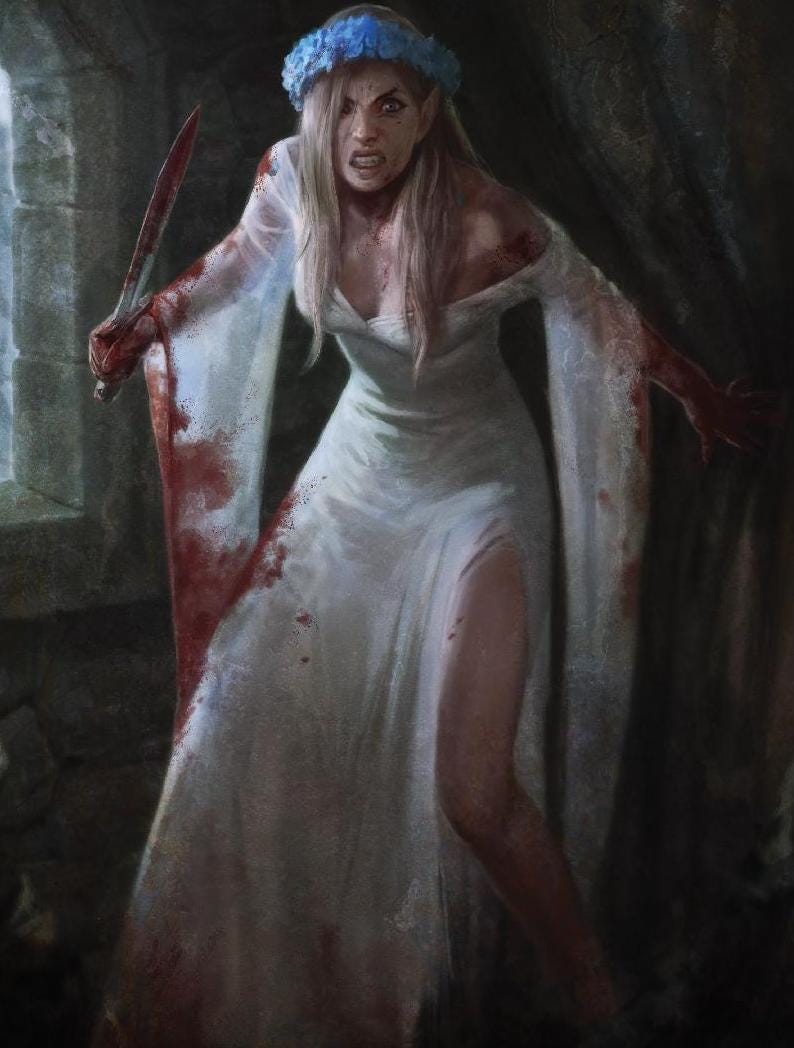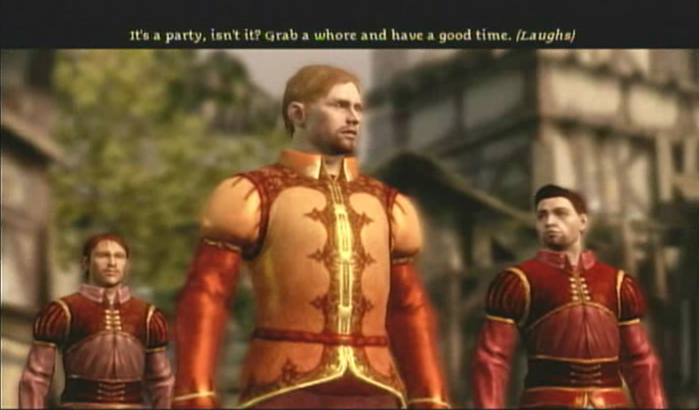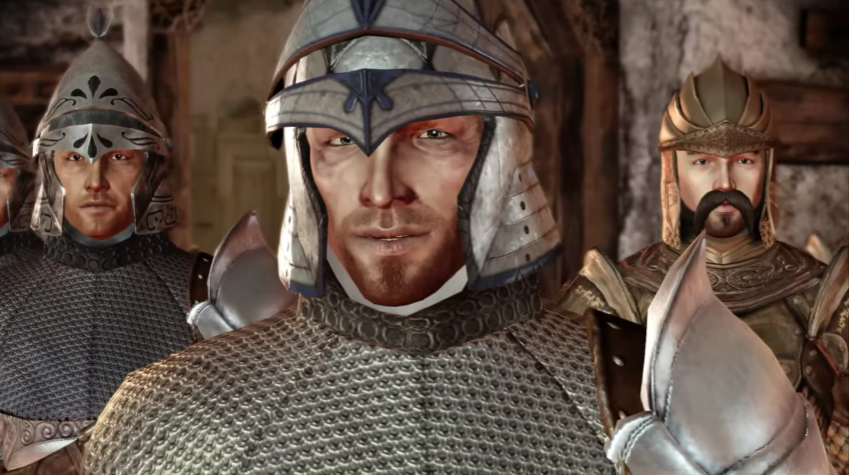 |
| Female City Elf Concept Art for Dragon Age: Origins |
A Sense of Doubt blog post #2475 - Knife Ears - Game Criticism
Another share...
Sort of low power for a while but not officially.
from - https://medium.com/@dialacina/youve-a-lot-of-nerve-knife-ears-indigenous-trauma-and-the-female-city-elf-in-dragon-age-origins-ad4da5a8cdc1
Fuckboy & Co. show back up with an armed escort. They storm the wedding, knock us unconscious, and haul us and our bridesmaids off for a literal rape “party.”

You’ve a lot of nerve, Knife
Ears: Indigenous Trauma
and the Female City Elf in
Dragon Age: Origins
(CN: racism, systemic oppression, substance abuse, misogyny, sexual violence, trauma)
 |
| Female City Elf Concept Art for Dragon Age: Origins |
It’s been nearly 8 years since Dragon Age: Origins dropped to great acclaim and sales. A lot has happened since then — with the series, games, and how we talk about them.
Origins has become an old nest. But it’s still lively with hornets. So let’s kick the shit out of it.
There are six origins a player can choose when starting the game, working as tutorial and introducing you to the world and providing a unique hook into the main quest. With the exception of the mage origin, they break down on racial lines. Most have minor changes depending on gender choice, all have their share of violence and turmoil, but the female city elf origin represents a colossal tonal shift from the others.
Like a lot of fantasy, humans in Dragon Age are the default. They function as a representation of the typically white, cisgender, heterosexual male status quo. Everyone who isn’t human becomes an other. The elves of Ferelden are a composite of real life marginalized people — conflicting, stereotypical ideas about Native American, Romani, and Jewish cultures, as well as their contemporary and historical traumas.
(For the sake of disclosure: I’m Native, so that’s the critical lens I’m using here.)
We open with a cutscene as Duncan, echoing the language a younger Thomas Jefferson and Benjamin Franklin use when describing the “Noble Savages” of North America, tells us about the city elves of Denerim (the capital city of Ferelden). A tone that any “benevolent” human will repeat when discussing the elves in Dragon Age from here on out.
Elves were slaves to humans “long ago,” but have since gained some degree of unequal freedom. They live in “walled off communities” known as alienages (a conflicting and messy hybrid of ghetto and reservation). City elves find work as laborers and servants to humans “when they can.” After establishing this structural oppression (but giving no hints to the culture of elves before enslavement by humans), we’re treated to scenes of elves having fun. “Denerim elves are a strong people, who take pride in their close community.”
The quest “A Day for Celebration” (a joke at the horrors awaiting) begins with our cousin Shianni waking us up after having overslept for our wedding day. We’re given nothing about the importance of ceremony or marriage in the lives of elves. At this point, elven existence is structured around turmoil and occasional reverie.
We talk to our dad who gives us a paternalistic but well-meaning “Oh my girl’s all grown up” speech. He cautions us to forget all the martial training our mother gave us — that being a “troublemaker” was “her mistake.” Dialogue options provide hints that our mother was murdered by humans. Racialized violence against women, when not the direct narrative, provides set-dressing for this story. Great.
The first elf we’re treated to who isn’t a relative — is drunk. The one we can speak to is literally named “Drunken Elf.” Yes, the third NPC we meet in Dragon Age as a city elf is the tired, racist “Drunk Indian” stereotype. While we’re given a glimpse that weddings may be a community-wide event for elves, there’s no commentary on the deleterious effects of systemic oppression or its correlation to substance abuse. It’s played for an easy joke — one that doesn’t even match the tone of this introduction.
Nessa, whose family is being evicted by their cruel human landlord who wants to use their home for storage, is the next NPC we encounter. Already relegated to living in the alienage, Nessa’s plight is used for flavor — drawing upon real world removals and denial of ownership. We can solve her immediate crisis while failing to establish longstanding change (a trend for both this introduction and the rest of the game).
It’s fun, we’re having fun.
So much fun developing structural inequality for our character with real world suffering and cliche.
We run into our cousin Soris, who is less than thrilled about his bride (she’s nice, practical). And then because we’re truly committing to establishing the tragic and oppressed lives of elves the writers give a face to our oppressors in the form of fuckboy Vaughan Kendells and his fuckboy entourage.
 |
| Our human oppressors: literally white, cis, straight guys with money and political power. |
Vaughn and his bros indulge their racialized misogyny and assault us and a few other lady elves. Soris pulls some respectability politics crap, but ultimately Vaughn gets a jar thrown at his head. It knocks him out, and before he’s dragged away by his bros, we find out he’s the Arl’s son and “you’ll be sorry.” Because of course we will.
We’re a marginalized woman having an origin story in a “Dark Fantasy” game. We’re already sorry, right? Don’t worry — it gets worse.
We come face to face with Duncan. We accost him. As we’ve just seen, humans rooting around in alienages means trouble. He comments that we’re brave to confront an armed human without a weapon. City elves aren’t permitted weapons, mirroring the disarmament and inability to resist that colonial powers often inflicted on indigenous people — something that figures often into Western genre fiction, and now here in Ferelden.
He gives us his standard song and dance about needing heroes who will answer the call to adventure and congratulates us on our impending wedding.
Then it’s off to get married…
Our wedding is in the Andrastian faith. It’s the dominant religion in Ferelden. It’s based upon the Chant of Light which was delivered from the Maker by Andraste, his profit, our savior. It’s easy to read it as a light interpretation of Christianity, complete with its own monsastic orders, thuggish templars and inquisitions. Because the traditional polytheistic elven faith has been outlawed (like Native American religion was in America until 1978), we can assume that our character (like her alienage) is written as having assimilated into it.
One almost wonders if Ferelden has plans for residential schools.
(TW: sexual violence, abduction, misogyny, trauma)
It’s not entirely unanticipated, but this plot progression marks a massive tonal shift from the more passive set-up of an oppressed background for your character. You’re going to have to get a tutorial about combat, and no one at BioWare could think of a less horrific way to force it than what comes next.
Fuckboy & Co. show back up with an armed escort. They storm the wedding, knock us unconscious, and haul us and our bridesmaids off for a literal rape “party.”

I’m not joking or exaggerating. I’m not being flip. I’m not even reading between the lines. Your character comes to in a cell where we are imprisoned, waiting to become “entertainment” for the Arl’s son and his friends.
Yes, our origin story forces us to play through the kidnapping and attempted/sexual assault of ourselves and our bridesmaids.
One woman is so severely traumatized she can do nothing more than rock back and forth muttering “Maker protect us.” The others plead for us to just accept it and not fight, because then it’ll be easier.
That’s when the guards turn up.
 |
| I’ve had quite enough of this image in my real life, thanks. |
Our nearly-catatonic friend leaps up yelling for the guards to stay away, and is brutally murdered without hesitation. The writers really lean in, “I suppose that’s what happens when you try teaching whores some respect,” the guard barks before hauling all but us off.
The two guards he leaves are the combat tutorial. Soris arrives intent on rescue thanks to some weapons from Duncan. Even this temporary liberation cannot come without the providence of men and a human. What follows is as close to catharsis as this character choice ever gets.
You get to murder your captors. Killing room by room as periodic cutscenes interrupt the mayhem to let humans shout a few Ferelden racial slurs at you. You find your murdered fiance, and resume the bloodbath all the way to the Arl’s son himself.
We find him standing over the supine body of our cousin Shianni with his friends. She begs us to take her home. They threaten to fight us. Vaughn tries to barter, offering us money and insisting that if anything happens to him our alienage will be slaughtered. Soris reminds us the alienage has been previously “purged.” Vaughn offers to let us go and return Shianni and the other women in the morning “slightly worse for wear” — fucking gross, and anyway we’re not interested. So they all have to die. It maybe something, but not enough.
When the killing stops, we go to a visibly distressed Shianni who stammers about all the blood, and asks if we killed everyone. “Good, good” is all she can manage when we assure her that yes, we killed a lot of white guys. And then we go home.
Duncan and the Elder are waiting for us, they know the guards won’t be far behind. None of this seems to phase anyone, it would appear this isn’t an uncommon occurrence at all. As the other elven women leave with Shianni to rest, the guards show up.
In a stunning #NotAllHumans moment, the human guard exercises restraint (not wanting an innocent elf bloodbath on his hands) and offers to take us away to the dungeon since we acted alone. Duncan interdicts to conscript us into his army of Grey Wardens, which supersedes the guard’s authority. Given no choice in the matter, we can only thank our benevolent human for saving our lives — and using our kidnapping as an entrance exam (he literally calls it our “mission”). In the world of Dragon Age: Origins, the only way out of the cycle of oppression for elves is to become a magical soldier against a threat to human’s hegemonic power — or die. Fantastic.
Before leaving with our new master, we visit a much-recovered Shianni who thanks us for saving her, Soris who is going to get married and try to make life better in the alienage with his wife, and our father with more well-intentioned paternalism. Then it’s off with Duncan to become a Grey Warden like the other origin stories.
From here on out, the alienage is walled off until a later quest called “Unrest in the Alienage.” You might expect an opportunity to further investigate the systemic oppression of the elves, even provide a resolution, but BioWare isn’t interested in that. That quest revolves around rumors of blight and a Tevinter slave trader. There is no resolution for the elves, and certainly not even a chance at liberation.
We are forced to play through this section to establish how tortured our fantasy lives are with no chance at recompense. This is our origin.
Fuck everything about the female city elf origin.
None of the other origins are remotely this egregious, none even tread close to this territory. The human and dwarf noble get to investigate the politics of their spheres. The mage introduction dabbles in their poor treatment and reasons for it through the failures of a fellow mage. The Dalish origin reconnects us to their ancient elven past and the dangers there. And while the dwarf commoner origin does delve into the troubled lives of the lower-class, it does so without needing to mirror real abduction, sexual violence, and murder.
No one really knows the number of missing and murdered indigenous women in the United States or Canada, only that it’s an epidemic of racialized violence that’s gone largely ignored by law enforcement.
According to the National Institute of Justice Research Report from May 2016, “More than 4 in 5 American Indian and Alaska Native women (84.3 percent) have experienced violence in their lifetime.” Among those women — 96% experienced sexual violence from an interracial perpetrator. In some areas of the country, sexual violence experienced by indigenous women is as high as 12 times the national rate. This is all despite making up only 2% of the U.S. population.
BioWare takes these real historical and contemporary traumas and makes them set-dressing and background story. There’s no interrogation, no examination, and aside from the direct perpetrators — little moral judgment. We don’t discuss the lingering effects of sexual violence in the forms of addiction, poverty, PTSD and other mental illness. The game can’t even force itself from saying that not all humans are complicit in our oppression.
Vaughn and his friends were just “misguided” boys. After all, we need to save these people in the end.
In later games, BioWare even goes so far as to suggest that elves are responsible for their own oppression.
It’s thoughtless, cruel, comes entirely without warning in character creation, and it’s wholly unnecessary. This entire section doesn’t need to happen to establish the oppressed lives of city elves or our hero. And if anyone is thinking “but it’s realistic” — this is a fantasy game.
If science fiction is a tool box for interrogating our world, fantasy is a way of preparing ourselves to cope with that world. It transfigures our fears into metaphor, sheathes our sorrows in symbolism. Most importantly, fantasy shows us that we can vanquish them. In our heroes’ slaying of dragons, we learn we can slay our own dragons.
There is no metaphor in our origin as a city elf. Our fears and traumas are laid bare, without metaphor, without symbolism, for no purpose other than evoking tone. It’s a harrowing lifted from the daily lives of real indigenous women.
Origins does give us a very literal dragon to slay, but it’s detached from anything we’ve experienced. It only becomes our fight by happenstance. It’s a big amorphous threat. One that cannot even be beaten, only pushed back for a time. Its resolution provides none for the lives of people we left behind or met along the way. But it does provide relief for the humans in our story. Dragon Age asks us to die for a cause bigger than ourselves, it asks we give our lives for hegemony’s sake.
Fantasy should give us a torch for the gloom in our lives. Dragon Age: Origins douses us with bog water and tells us, “Some people were just destined to suffer.”
+++++++++++++++++++++++++++++++++++++++++++++++++++++++++++++++++++++++
+++++++++++++++++++++++++++++++++++++++++++++++++++++++++++++++++++++++
+++++++++++++++++++++++++++++++++++++++++++++++++++++++++++++++++++++++
- Bloggery committed by chris tower - 2111.27 10:10
- Days ago = 2339 days ago
- New note - On 1807.06, I ceased daily transmission of my Hey Mom feature after three years of daily conversations. I plan to continue Hey Mom posts at least twice per week but will continue to post the days since ("Days Ago") count on my blog each day. The blog entry numbering in the title has changed to reflect total Sense of Doubt posts since I began the blog on 0705.04, which include Hey Mom posts, Daily Bowie posts, and Sense of Doubt posts. Hey Mom posts will still be numbered sequentially. New Hey Mom posts will use the same format as all the other Hey Mom posts; all other posts will feature this format seen here.
No comments:
Post a Comment